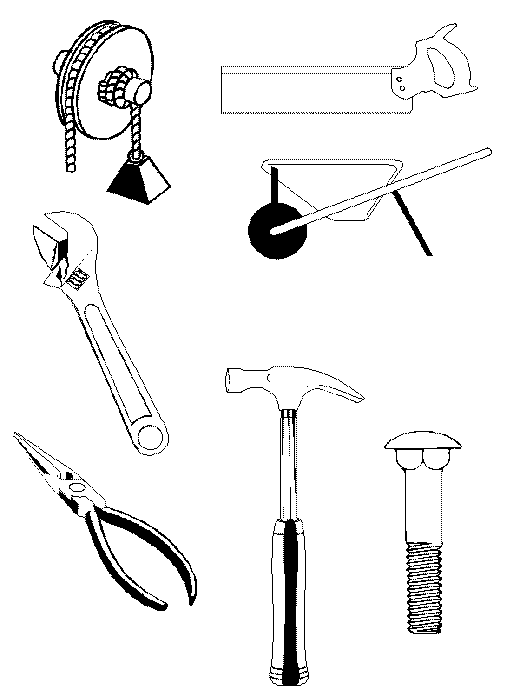PRE LAB: Simple Machines
OBJECTIVES: Exploring different tools. Discovering technology.
VOCABULARY:
WORKSHEET:

I was surprised to find that Junior already knew the name of almost all these items and what they are used for. This is probably due to the fact that he's always hanging out with papa and his cool inventions. Overall this is a great way to kick-off learning about Simple Machines in our Technology unit of Science and how we use them on a daily basis to make our lives easier.
Grace to You,
Jenna
OBJECTIVES: Exploring different tools. Discovering technology.
VOCABULARY:
- machine
- physics
- society
- technology
- tools (hammer, screw driver, pliers, wrench, nails, wood, something with a lid to unscrew)
- worksheet

Technology is using knowledge to improve society. Many tools and machines are created to help humans work easier. Without tools and machines our society would progress very slowly. Children today cannot think about living without television, much less the many machines we depend upon.
A simple machine is a term used in mechanics ( a branch of physics) to describe fundamental devices that help do work more effectively. The basic simple machines are wheel and axle ( to make things move); a lever (to help make work easier); and a wedge (to help direct energy to be more efficiently). Tools use the principles of simple machines. Simple machines could very well be the first technology ever invented by humans.
PROCEDURE:OPTIONAL: Set up three stations your students can work through trying out each tool and learning how to use them.
- This exercise introduces students to simple machines. Show your students any tools you might have. If there is a janitor at your school, have the janitor illustrate all the tools they use to help make their job easier.
- Use the worksheet to illustrate examples of tools that help make work easier. Simple machines were invented to make life easier. Students do not have to understand how or what simple machines are. The focus is to exposure them to new words and the association of words with an object.
 |
| Station 1: working with a hammer using both ends as a simple machine. |
 |
| Station 3: Using a wrench to open and close a screw. Again I let him choose which one he thought would work best, first he chose the pliers then tried the wrench. |
 |
WHEELBARROW - makes moving heavy objects easier, move faster
WRENCH - lever, can direct energy to tighten or loosen screws or nuts
SHOVEL - a lever and wedge that directs your body to pick up soil
PULLEY - helps to lift objects
RAMP - helps lift large objects
PLIER - helps open and close objects easily
HAMMER - the portion that helps remove nails is a lever
SCREW - helps to secure objects
WORKSHEET:

I was surprised to find that Junior already knew the name of almost all these items and what they are used for. This is probably due to the fact that he's always hanging out with papa and his cool inventions. Overall this is a great way to kick-off learning about Simple Machines in our Technology unit of Science and how we use them on a daily basis to make our lives easier.
Grace to You,
Jenna


























